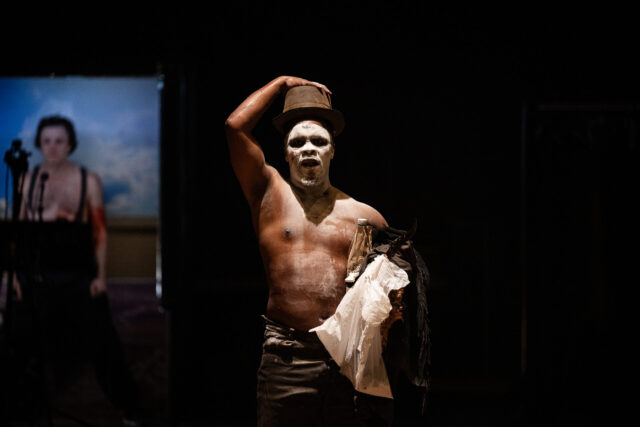
Thulani Zwane is one of seven South African actors exploring the history of violence in America in Dark Noon (photo by Teddy Wolff)
DARK NOON
St. Ann’s Warehouse
45 Water St.
Tuesday – Sunday through July 7, $34-$64
stannswarehouse.org
“People gotta talk themselves into law and order before they do anything about it. Maybe because down deep they don’t care. They just don’t care,” former marshal Martin Howe (Lon Chaney Jr.) says in Fred Zinnemann’s Oscar-nominated 1952 western High Noon.
The lawless of the wild West, specifically involving the European settlers’ lack of care in their treatment of Native Americans and, later, Chinese immigrants, is skewered in Tue Biering’s biting satire, Dark Noon, the Edinburgh Festival Fringe hit now at St. Ann’s Warehouse through July 7. Presented by Biering’s Copenhagen-based fix+foxy and performed by seven mostly BIPOC South African actors, the traveling show is reminiscent of Between Two Knees, the low-budget farce that ran earlier this year at PAC NYC by the Native American sketch comedy troupe the 1491s that zeroed in on the violence and disrespect Indians experienced at the hands of the US government between 1890 and 1973. Inspired by Hollywood westerns and, primarily, High Noon, writer-director Biering and codirector and choreographer Nhlanhla Mahlangu focus on the several hundred years prior to 1890, as the white colonialists steal land from the Native Americans and line their path west with their dead bodies. Both productions are too long (Between Two Knees was 145 minutes with intermission, Dark Noon is 110 minutes without) and overly repetitive but feature funny improvisation, although Dark Noon shoots and misses more frequently.
The audience sits on three sides of the large staging area, which at first consists only of a small booth in one corner and a big screen behind it. Multiple mobile cameras and microphones capture the action as the cast — Bongani Bennedict Masango, Joe Young, Kaygee Letsholonyana, Lillian Tshabalala, Mandla Gaduka, Siyambonga Alfred Mdubeki, and Thulani Zwane — is baptized in white face powder and makes its way through cannibalism, invasive immigration inspections, fighting the elements, battling so-called pioneers, a slave auction, forced assimilation, being moved to government reservations, the Civil War, the gold rush, Asian hatred, and the building of the transcontinental railroad. As events unfold, they are narrated by one of the actors in the booth and broadcast live on the screen, from a football game between the Settlers and the Natives to the development of towns centered around roofless saloons, brothels, and churches, which are constructed of wooden beams and planks.
Early on, after a senseless shootout, one of the narrators (Tshabalala) explains, “Once, life was fragile. People were living by the law of the gun. . . . It was a time when white lives didn’t matter.” Later, another narrator (Young), talking about the war over land between the white settlers and the Native population, declares, “The American cycle of violence was born.”
It’s a cycle of violence that is as prevalent as ever in the twenty-first century.
Dark Noon is scattershot, as scenes go on too long and themes repeat, and the livestreaming of the action is overused; with things happening so fast, it’s often hard to know where to look. However, despite all the fear, hate, and death, the play is also filled with an incisive sense of humor as it challenges ideas of religion, racism, immigration, the justice system, and capitalism (in the form of Coca-Cola), evoking what happened in South Africa during apartheid and what is still going on today in America, including at the southern border; it’s as if not as much has changed as we like to think since those shoot’em-up days of yore, celebrated in the films of John Ford, Howard Hawks, John Sturges, Delmer Daves, and John Wayne.
The energetic cast is in full motion the entire 110 minutes, singing and dancing and switching between roles and Camilla Lind’s costumes at lightning speed as Johan Kølkjær’s set slowly builds up over time; a coda in which the actors get personal is genuinely affecting. There is also a significant amount of fun audience participation; if you’re interested, then go for the $30 Gold Rush seats.
There’s a decided lack of audience participation in High Noon; as the twelve o’clock showdown approaches, the principled Marshal Will Kane (Gary Cooper) finds that he is going to have to face the murderer Frankie Miller by himself, since all the capable men in Hadleyville turn away from him. But he keeps on fighting the good fight, just like every one of us should, regardless of the odds, on a mission to quell the seemingly neverending American cycle of violence.
[Mark Rifkin is a Brooklyn-born, Manhattan-based writer and editor; you can follow him on Substack here.]